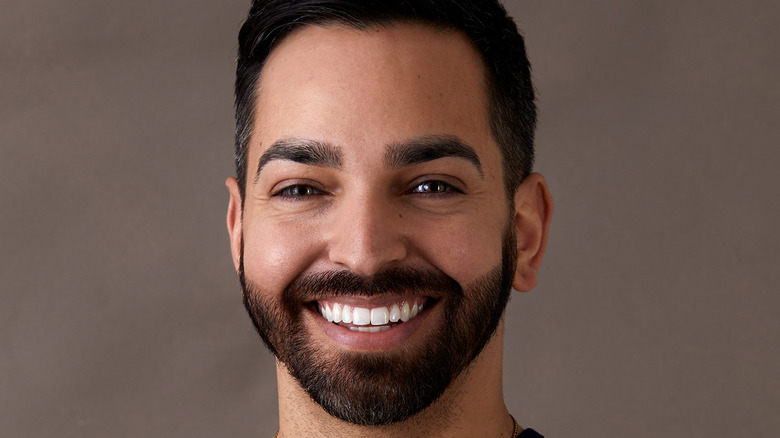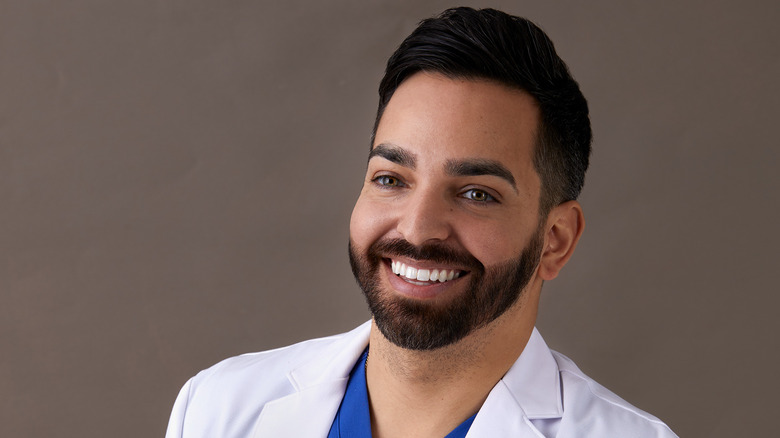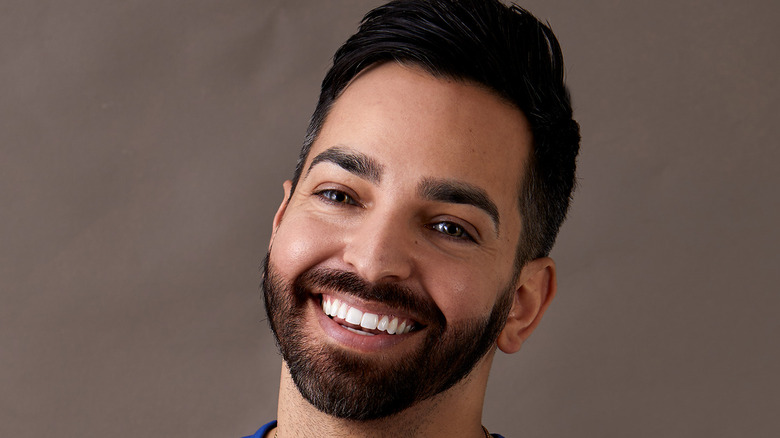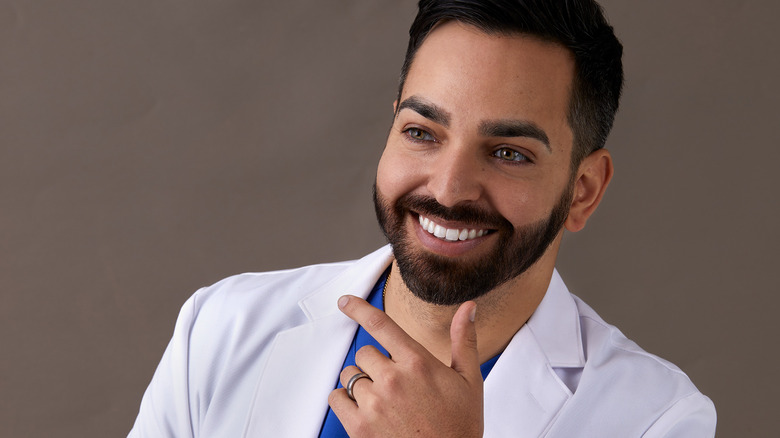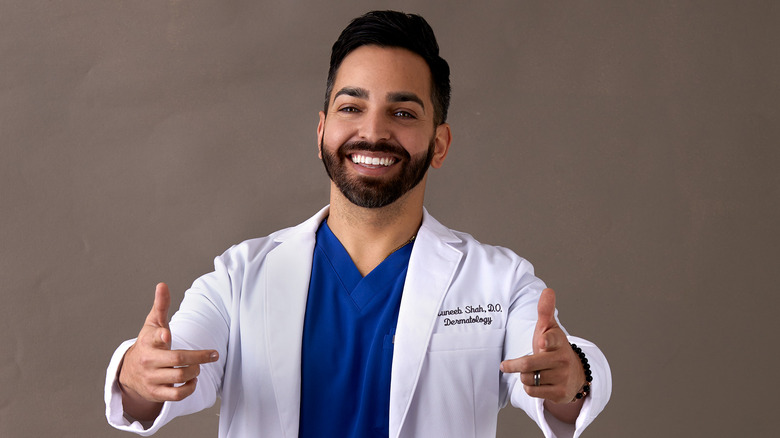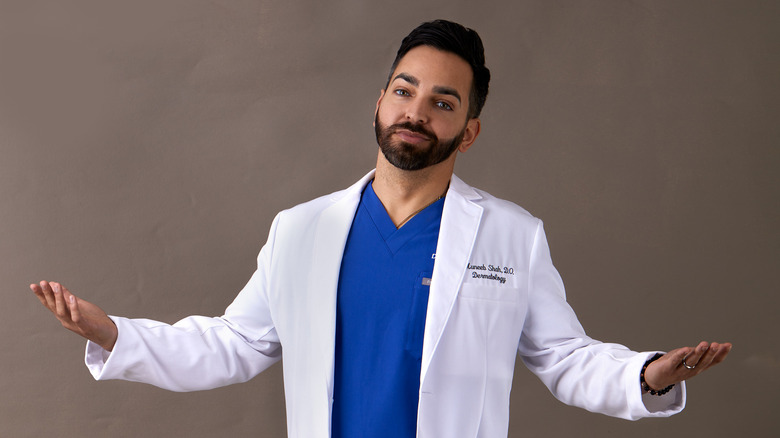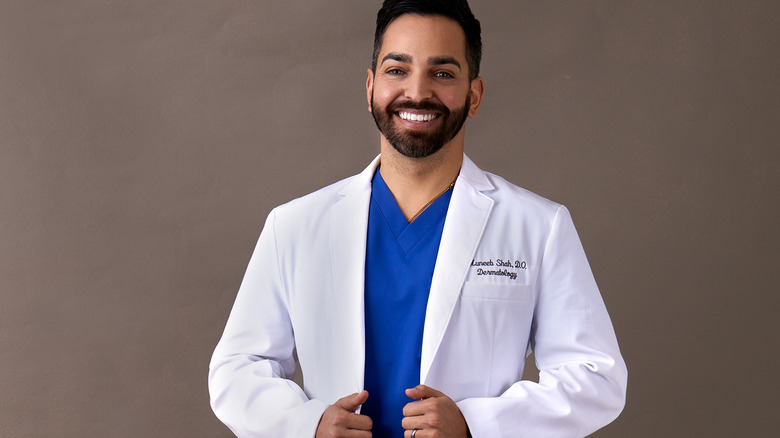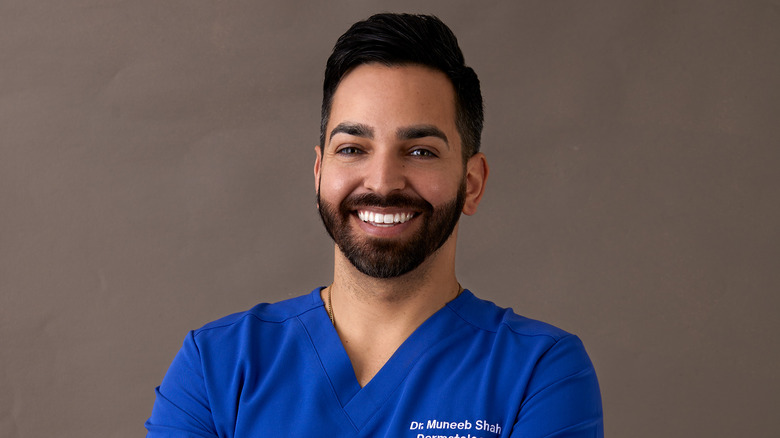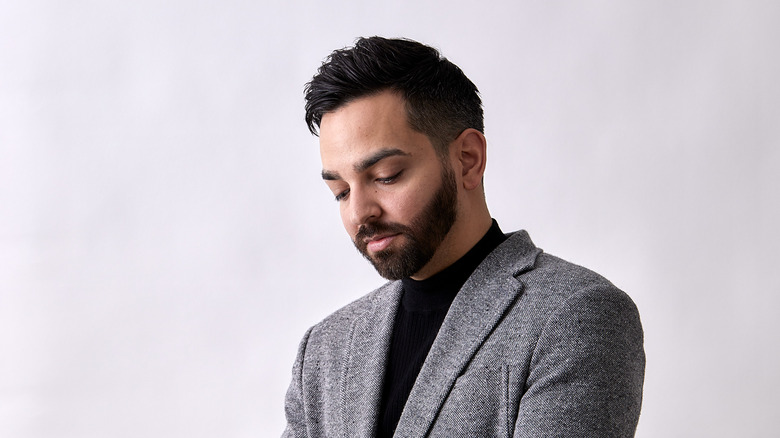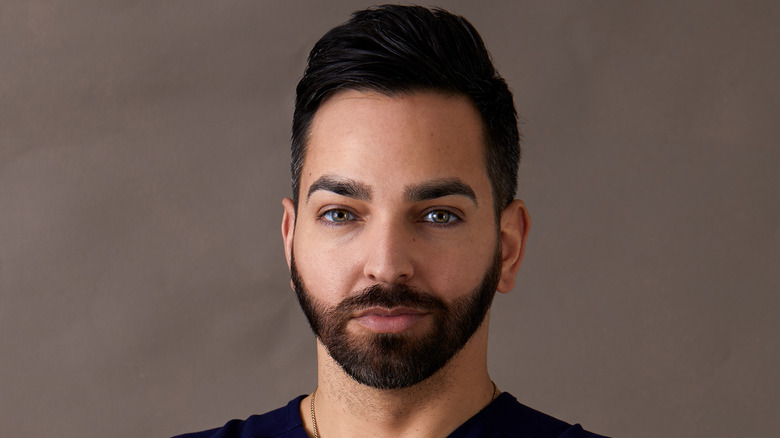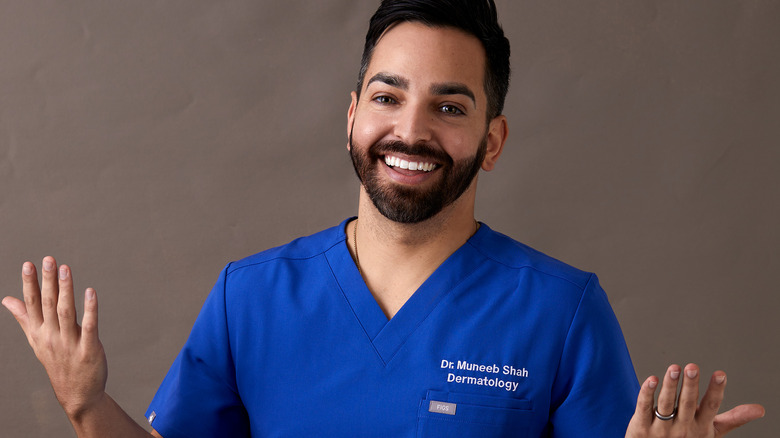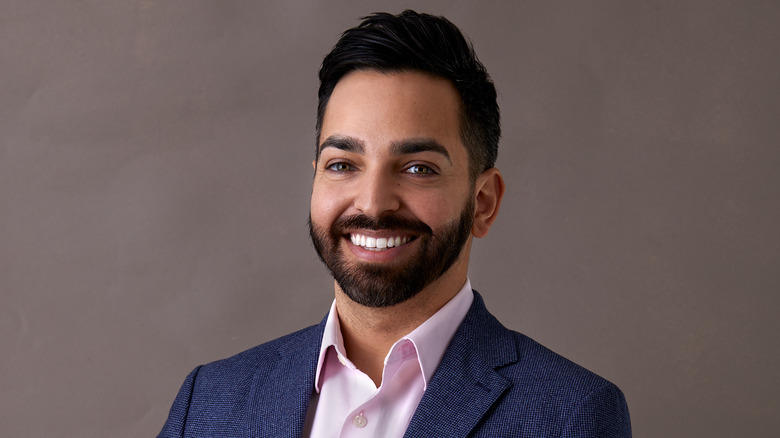Dermatologist & 'Skinfluencer' Dr. Muneeb Shah Talks TikTok Skin Care Trends & Products – Exclusive Interview
We may receive a commission on purchases made from links.
Dr. Muneeb Shah — or Doctorly as he's known on his socials — is on a mission to debunk skin care myths and save us all from bad advice. Shah is a dermatology resident physician at Campbell University, where he sees patients in the Wilmington, North Carolina area. But his expertise isn't limited to North Carolinians.
At the beginning of the pandemic, Shah started posting skin care videos on TikTok and his following exploded. Millions of TikTokers and YouTubers tune in for his expertise and hundreds of thousands of others follow him on Instagram. Shah never thought that so many people would be interested in his videos, which he started making just to share with friends, family, and colleagues. However, his simple, straightforward, and evidence-based advice resonated with people, and now he's a bona fide skin care influencer.
In an exclusive interview with Health Digest, Dr. Shah discusses his rise to influencer status and his passion for dermatology. He also reveals the best skin care routines and the trends you should definitely ignore.
Discovering a passion for dermatology
What sparked your interest in dermatology and what do you love most about the practice?
It's a very visual field whereas in a lot of specialties, if someone has high blood pressure or diabetes, you work to get those under control through various medications, but they're hard to see. And when you treat them, the patients often don't know the difference right away, because these are long-term conditions, whereas with a dermatologist it's very visual.
You walk in, oftentimes [you know] what the diagnosis is when you see it because you've seen it before. If you don't, you can get a piece of the skin very easily with a biopsy without having to do something invasive. You can just take a piece of the skin right in front of you, and then you can treat it. And you can see the patient do better. And sometimes we take pictures. Even for something as simple as acne.
When we see someone coming in with acne and it really is affecting their life, we have photos. Then three or four months down the line, they have clear, perfect skin. It's amazing to see that transition. And it gives me a lot of job satisfaction, but also I think the patients are very happy with the outcomes a lot of times. And so really [it's] a patient-focused field where we actually can see results. I really just love that visual aspect.
That's great. And where did your passion for educating people come from?
That was actually primarily my thing. Pre-TikTok, pre-YouTube, pre-Instagram, I loved to be an educator, and my audience before was the medical community. I used to write a lot, I used to mentor a lot, I used to tutor a lot. And I used to also create medical curriculums for medical students. And I loved teaching medical students, loved mentoring pre-med students. And that was sort of my outlet.
I always thought I would just do that. I would end up in the medical education space, specifically talking to professionals, and then the pandemic hit. Our medical students weren't visiting the office anymore. And I got on TikTok and I realized that there was a need for someone to communicate simple information to people to improve their skin health. And there was a lot of misinformation out there. I didn't realize that there was such a white space that existed.
I started to create content that really resonated with my core audience. And I realized I could educate millions of people the same way I would do with the medical community, but just on a larger scale. And so I kind of took that and ran with it.
Bringing his expertise to TikTok
Can you tell us more about getting the idea to start posting on TikTok?
Really, it just started out for fun. I kind of created content that I thought was exercising my creative mind and I enjoyed that aspect of it. Now, initially, I [thought] I'm just going to make dermatology content. I thought I was going to make fun, relatable content about my life that no one would see. I thought I would just make the videos, send them to close friends and family, and [the] immediate circle that knew me would see this and just find it entertaining. Because ... I wouldn't say outgoing, but ... I have a lot of energy at work in general and in all aspects. I thought it was just a good way to represent who I was and use that creative mind.
And then when people in the comments were saying "well, can you teach me about acne?" or "can you teach me about acne scarring or pigmentation or anything?" I started to realize okay, well there are these people that want this. And I made my first response videos to one of these questions and then they really just started taking off. And I was [like], "Wow, I have this information, [as] if I was an accountant or a lawyer. I was trained to do this and I can make this very simple for people and from an accurate, evidence-based source." And so I just doubled down on that as I saw that it was really resonating with people.
I felt like, "Okay, I need to actually start creating this." And I just pushed myself to create content that resonated more and more with my audience and try and reach more people because, I think, it's good to make educational content on social media regardless, but if it doesn't reach your audience, then you need to figure out a way to make it resonate with people. That was part of the fun of it — trying to figure out a way to take education content and make it entertaining so that it would be shared and it would reach the audience that I wanted it to reach.
Education via social media
How has that platform of social media really changed the way that you're educating people?
Well, I think that you have to kind of know your audience now. On TikTok, it shows up right on their page. It's not a search. It's not people you follow a lot of times. It's people that are just scrolling for content that resonates for them. It's just the way that algorithm is. And so to capture those people, you have to really draw them in pretty quickly, and you have to get them to buy into whatever you're going to say next, early on. People aren't searching for things, you're being presented the things. And I think I create content in a way that it's short snippets. I get just enough information in there for people to act on it, not too much to overwhelm them, but enough to grab their attention and then maybe have them seek out more information elsewhere. And so that's what I do on TikTok.
On Instagram, there's a little bit of an audience, that's a little bit very curious [about a] particular topic. They follow you and see, you can give them a little bit more than that. A lot of times [in] the description, you're giving them more information about something they're already passionate about instead of presenting them with a new idea. You're just really filling in ideas of things that they already know and want to [build] upon it. And then on YouTube, it's totally different too. We do YouTube, soon to be the largest dermatology channel on YouTube probably within the next month or so–
Congratulations!
Thank you. Thank you. Thank you. It's fun. On YouTube, we now search. So people, lots of times, have a question. "How do I treat acne?" And so you're creating content to really answer questions for people just [like] any how-to video would be. That's how I make content, really — I make it for the audience, right? I know the science but I need to make it for the audience. And so I really cater to the people that watch the videos.
Debunkiung the misinformation
You talk a lot about the misinformation that people are getting about skin care. So what kind of made you zero in on that topic, especially on social media?
Well, for one I think there was a lot of misinformation, more than anything else. There was a lot of demand for that information. And then there were a lot of ways for companies to profit off of that information. And so I saw that as in, personally, my personal skin care journey, I found it very difficult to decipher what was actually good, what wasn't good, [and] what was hype. What was something that you should actually invest money in? And I, personally — even though I had the science background — felt overwhelmed when I would go shopping for skin care. And so it was my way of simplifying a lot of the nonsense that is out there so that not only could I benefit from it, but [so could] my family, my friends and everybody else.
I'm going to bring you on this journey of debunking and demystifying skin care because it really isn't that complicated. But I think a lot of people benefit from making things complicated and trying to sell you something or trying to fear monger on a certain issue or an ingredient or try to push something as the best ingredient of all time.
I think there's this balance. And I was like, "I can actually find the science on this and really dive in and just make people's lives easier." My content [has] is a self-care component. I find that skin care really helps me through the pandemic, just being able to focus on myself. But I don't make self-care skin care content. My content is meant for the person who simply wants better skin.
It's the mom that has three kids that has 10 minutes and $50 to make the right choice. It's the dad who just doesn't have the education behind it — he's working all day or spending time with the kids and is like, "I just want to improve this issue, but I don't know how, and I have a limited budget to do it." It's really geared towards that.
I think that my content is really just more of that problem-solving content for people that actually have something that they want to fix.
Addressing skin care misconceptions
What kind of misconceptions about skin care do you see circulating pretty regularly [on social media]?
I find that they come in phases. I think that one thing that always comes up is there's always some type of fear-mongering around an ingredient or saying certain ingredients are "dirty" and others are "clean." ... At one point DMDM hydantoin was a very common ingredient that people were fearful of and [some were] claiming that it caused hair loss. And there's no data that it actually causes hair loss, but they catch a lot of virality and then people avoid those ingredients. And then other companies come in and they say, "Well, our product doesn't have that so you should buy our product." So it becomes this thing, and I try to balance those out as they come in. That's just one example. So it's this fear-mongering that's usually overblown that I'm always trying to debunk.
I think another thing is this idea that medical-grade or very expensive skin care is somehow better or that you have to really spend a lot of money to have better skin. I think that's something that is very common on social media. That's just not true.
Right now, around this time of year, one of the things that's just very common is tanning. People in tanning booths, people thinking that base tans are good for you, that it's safe to get that. Of course ... the sun is responsible for vitamin D production. But [saying] that it's safe that you should be getting vitamin D from the sun when, in fact, it's just going to age you and give you skin cancer. And you can get vitamin D in safer ways. You're actually probably going to get enough vitamin D even if you wear sunscreen, just because it doesn't block out all of the rays that would help with that. And tons of people that get tons of sun are still vitamin D deficient. It's, I think, complicated. That's something that around this time of the year people are always pushing through: base tans or thinking that maybe their self-tanners are going to protect them from the sun or that they just simply just don't need to wear sunscreen.
Another thing right now is that sunscreen actually gives you cancer. I've seen this one going viral [claiming], "Oh, the more people wear sunscreen, actually that [why] skin cancer's on the rise." It turns out that sunscreen use is also on the rise. And so people think that somehow these things are correlated when they're not. There are many reasons why skin cancer's on the rise, but in fact, we know that sun causes cancer and we do not know that sunscreen causes cancer. We do not think that sunscreen causes cancer.
Skin care trends you should definitely ignore
We sometimes see on various social media platforms, but I feel more on TikTok sometimes, actual dangerous trends that are going around. Have you seen anything lately on TikTok about skin care trends that you think people should definitely ignore?
Yeah, I think one that came up recently is using a needle and ink to give yourself freckles — super dangerous putting anything underneath the skin that's not supposed to be there. [It] can cause really bad inflammatory reactions. That was popular.
They [also] had these hyaluronic pens that were injecting hyaluronic acid into the skin. Again, things that don't belong under the skin and are not sterile being placed underneath the skin.
Right now, there's a couple videos going viral about using lemon in your hair and using lemon on your skin to lighten dark spots and treat hyperpigmentation. But we actually know that if you're exposed to the sun while lemon is on your skin, it actually causes this phototoxic reaction that can actually cause really bad blistering. And so that's another one that's dangerous right now.
Baking soda's pretty harmful for the skin as well because the pH is too high. You see people scrubbing their faces with baking soda.
Using crushed aspirin on the face is pretty dangerous as well. It's an uncontrolled concentration of acetylsalicylic acid. A lot of people think, "Well, your products that treat acne, they have salicylic acid in it" but that's at a maximum concentration of 2%. Whereas your acetylsalicylic acid in aspirin is an uncontrolled concentration that you'd be placing on the skin. So that's pretty dangerous.
Building a skin care routine from the ground up
What is the most basic daily skin care routine that you recommend to people?
I think skin care routines are built on a foundation, and I think everyone's goal is to have better skin. So they go for the active ingredients ... they'll say "I want a retinol, I want an exfoliant, I want XYZ thing to get better." But I think if you're new to skin care, first you have to build the house before you can put the paintings up.
What I recommend for people that are new is just get a simple cleanser, a gentle cleanser, something like the CeraVe Hydrating Cream-to-Foam Cleanser, get a moisturizer ... if you have dry skin, you may want something like a thicker cream. If you have oily skin, you may want more of a gel-like moisturizer. I really like the SkinFix products for moisturizing. And then a sunscreen. A simple sunscreen a big fan of the EltaMD sunscreen line. It's a dermatologist's favorite.
And that's the simple cleanse, moisturize, sunscreen [routine] that everyone should have as their foundation. Now in between those steps, I say, "cleanse, treat, protect." You have your "cleanse "and your "protect" when you have your cleanser, moisturizer, and sunscreen, but you don't have the "treat." Once you build that foundation, you add the treatments in there, and those are the treatments that are going to have you see your results. ... Those treatments need to be specific to you. So if you're somebody who's trying to go after wrinkles or you want to go after pigmentation or you're going after acne, you're going to choose that treatment for that particular issue that you have
To go off of that, do people really need a ton of products to keep their skin healthy and looking good?
No! I mean, I usually use anywhere from three to four products a night in my routine. Pretty simple. You can get by on a three-step, skin care routine pretty well, and if you want to get fancy, you can get up to five. Anything more than that, you're going to end up in trouble.
Partnering with skin care companies
You partner with a few different skin care product companies. How did you choose which ones that you would partner with?
This is such a complicated formula. ... I think everyone has to come with their own moral compass, and my goal is not to police other people's decisions on what they decide to endorse and say because everyone has different skin care ethics that they go by. I simply have my dermatology education, so I know what's good for the skin; I know what's bad for the skin. I apply those principles to every product that I look at: Does this work? Does it claim to do what it's going to do? And is it safe? Those are the main things. But then you have a lot of products that fall into that category. You can't recommend all those products and take partnerships from all those products. So then you say, "Okay, well, is it a good price point? Is there a product that maybe is better in the same category that you would get?" And so you can basically fractionate this in so many ways. It actually gets pretty complicated, and then it becomes very difficult to decide. ... I limit mine to the classic beauty brands that derms have been fans of forever.
It's simple now for me because I just say, "Okay, well with all this data that I have and I know, would I recommend this product to my mom, my sister, my dad, my wife?" ... [If not] it could be even simply [be that] I just think the price is not fair. ... I'll just feel you can do just as well with a cheaper product; I can't recommend that because I would feel bad if someone else's mom or dad bought that. That's my thing. And so ... I always sleep well at night. I don't ever feel if anyone challenges: "Oh, he worked with CeraVe? Oh my God!" I recommend CeraVe to my mom and my dad all the time.
I feel good about what I recommend and the partnerships that I take. And that's basically my moral compass for this. And you end up turning down a lot of deals, but you get the ones that you want and you sleep better at night. And you have more trust with your following, which is actually what drives this whole thing. If you lose the trust of your following, who are very smart, by the way. ... Some people trust blindly, but a lot of people are very inquisitive and they're internalizing things you've said in the past. And if you alter from that, they know. So then you lose their trust and what is the value of that? Then I feel it's just not worth it to me. So I keep it pretty simple.
What to look for in a quality skin care product
What makes a skin care product really top of the line — like you said, not necessarily price-wise but quality-wise? What should people be looking for in these really good quality skin care products?
Quite honestly, you don't know. Now we are so limited by what the manufacturer is going to tell us. ... It was very popular to look at ingredient lists probably about two years ago. And now there's almost been a backlash against ingredient lists from a lot of the skin care community. It's very subtle, it's very small –and I'm involved in the skin care community, which is a small group of people, [so] I know. what the discourse is right now about these things — so there was a big push [saying] "you've got to know your ingredients. You've got to choose the ingredients that are safe and effective." And then there's a backlash against that.
Looking at the ingredient list, you don't really know how this comes together. ... It's [like] cooking. Just because you see the ingredients doesn't mean [you know] how it's going to taste. So there was this pushback against just focusing on ingredient lists: "Oh you shouldn't do that. You should just focus on how it feels and what it does."
I think, as consumers, you really do need to focus on the ingredient list because we don't know. I mean a company can say anything they want, but the only thing that we have to go on is the ingredient list to decide. Is this going to have anything in here that I'm allergic to? Does this have the ingredient I'm looking for that is going to treat the condition I'm looking to treat?
I would say look at the ingredient list. Make sure that they have safe and effective ingredients, which takes a little bit of research to figure out what you're looking for there. Look for trusted sources. I think a lot of dermatologists and skin care influencers are great on social media. They're going to give you very good and honest opinions and breakdowns.
And then the third thing, which not a lot of brands do, but some do, is research. They actually will publish clinical studies on their products. And then you can read the study and look at the inclusion criteria and the way that they ran the study and the results and decide whether or not you think it's a clinically effective product.
But they're all inherently flawed. There's no perfect way to really get it right. And so I would say rely on the ingredient list. Rely on recommendations from friends and family and your trusted skin care influencers. And then if you can find clinical studies, it's good, but not perfect.
DIY skin care? More like DI-WHY
Especially on social media, DIY skin care tricks are big. So what are some that actually work?
DIYs that actually work? If you have body odor using Benzoyl Peroxide cleansers, they kill the bacteria on the skin that causes odor. And so they're actually very effective as deodorants. So that's something that not a lot of people are aware of and that's a good DIY hack. ... I think depuffing in the morning with a cold spoon is actually pretty effective. It causes vasoconstriction, which does help with puffiness. So if you have to do a video shoot in the morning or you have an event in the morning and you're puffy because you ate too much salt last night, then I actually think that cold spoons are pretty helpful in a situation like that.
What other DIY do I like? You know turmeric as an ingredient, it's got a lot of data on it. But the problem with just using tumeric that you buy at the grocery store is that we don't actually know [what's in it.] The active ingredient in tumeric is something called curcumin. And when you buy powdered turmeric from the grocery store, there's a massive variation of the curcumin concentrations between one batch and another. And so it's not consistent.
I'm not a big DIY fan. I call it DI-WHY, as in W-H-Y, because why would you do it when you have a lot of really effective and affordable products nowadays? It used to be priced out. You'd be paying $100 for a skin care product. Now you can get great products [that are] much less expensive. So now I feel DI-WHY? Because you're probably going to spend as much money trying to make that product as you would if you just bought one that was already formulated for the skin.
Diet and skin care
How does diet impact your skin?
Diet plays a role — a big role — in everything. What you put in your body is going to affect your face. It's going to affect your heart, affect your liver, your kidneys. The body is not isolated organs. They all are interconnected. ... If you have a poor diet, it'll reflect in the skin.
The problem, though, is that there are not a lot of studies on how diet affects the skin because they're really hard to do because there are so many variables. You're not going to eat the same thing every day. There are other factors — sun exposure, smoking — that interfere with the results. And so isolating data, I mean on exactly what thing you eat is actually causing the problem is very, very difficult to do. We just don't have a lot of studies.
I suspect that a low-inflammatory diet would be beneficial for the skin, even though there's not a tremendous amount of data that says that it is. But I think the Mediterranean diet, which is known to be helpful for the heart, would be very helpful for the skin as well, just because it does have anti-inflammatory properties.
Right now it's Ramadan for Muslims that are fasting. There was a study that showed Ramadan, which is basically intermittent fasting to some extent, was able to decrease psoriasis. So, I think that there are probably some anti-inflammatory components to that as well.
Then you have sugar, which we know can cause acne. High-glycemic diets can also damage collagen and can cause aging. So, probably the one consistent thing that can affect your skin negatively is high-glycemic or high-sugar diets.
And again, you said that there's not a lot of data to go on this, but are there certain foods that we do know we can eat to keep our skin looking great?
I think foods that have high omega-3 content are pretty helpful. That can be various nuts and different meats and fish and things like that. That can be helpful. I'm not a diet expert, but ... turmeric has anti-inflammatory properties. There's nothing I would say, "Okay, everyone should take [this].} There's nothing I would say everyone should use to make their skin better. Other than maybe taking Niacinamide, Nicotinamide supplement, [because] high B3 levels have been shown to be beneficial to prevent cancer, but also have other benefits on the skin.
What is one thing you think everyone needs to know about skin care?
That protection and prevention are always going to be more effective and save more money in your wallet than trying to always treat after you've ruined your skin. I think focusing on sunscreen and moisturizing really, really go a long way, and focusing so much on treatments is not really the way to go. So I would say protection and prevention is the one thing I think everyone should really, really hone in on.
Dr. Muneeb Shah is a Dermatology Chief Resident at Campbell University in North Carolina. You can follow him on TikTok, Instagram, and YouTube for all things skin care.

